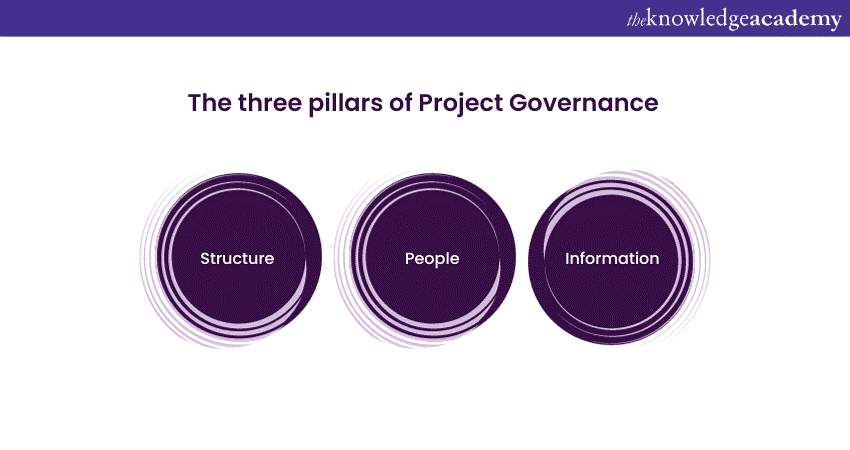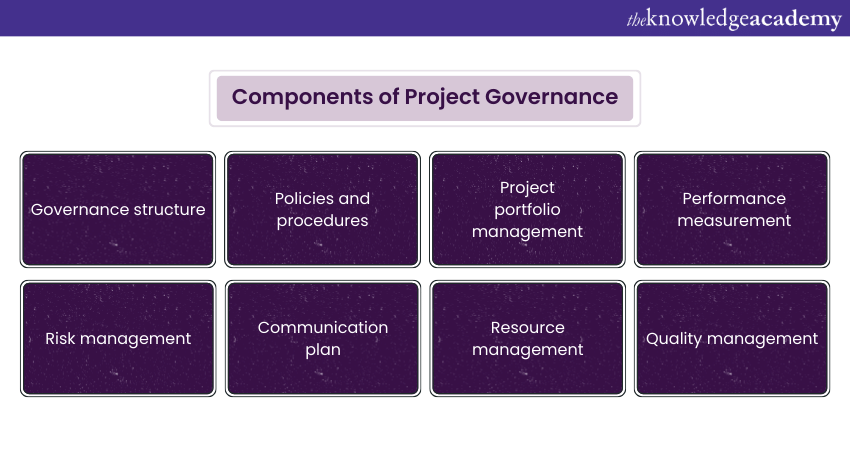We may not have the course you’re looking for. If you enquire or give us a call on +08000201623 and speak to our training experts, we may still be able to help with your training requirements.
Training Outcomes Within Your Budget!
We ensure quality, budget-alignment, and timely delivery by our expert instructors.

Project Governance is the set of principles, processes, and structures that determine how projects are authorised, prioritised, monitored, and controlled within an organisation. While Project Management focuses on the execution of tasks, Project Governance is concerned with decision-making, oversight, and ensuring that projects align with strategic goals. Therefore, understanding "What is Project Governance?" is crucial before starting any project. So, let's dive deeply into understanding What Project Governance means, its key pillars and why it is essential.
Table of Contents
1) What is Project Governance?
2) Why is Project Governance important?
3) What are the three pillars of Project Governance?
4) Project Governance roles
5) Project Governance frameworks
6) Components of Project Governance
7) What is the Project Governance model?
8) Conclusion
What is Project Governance?
Project Governance is the backbone of any successful project. It is a collection of structures, procedures, guidelines, and policies the Project Management team agrees upon to drive project progress and measure project success. It establishes how projects are managed and controlled, ensures that they align with the organisation's objectives.Project Governance outlines clear roles, responsibilities, and decision-making authority for those involved in the project, from Project Managers to stakeholders and sponsors. Effective Project Governance ensures accountability, transparency, and clear communication channels throughout the project's lifecycle. It contributes to achieving strategic goals and delivering value to the organisation.
Why is Project Governance important?
Project Governance is crucial because it provides a structured method that ensures projects are executed in alignment with the goals and objectives of an organisation. It sets clear guidelines, roles, responsibilities and processes for decision-making, ensuring accountability and efficient use of resources.
Effective Governance helps manage risks, enhance communication among stakeholders, and facilitate project delivery by adhering to the specific timeline and budget. This structured approach not only supports a project’s success but also contributes to an organisation's overall Governance. It further allows for meeting project outcomes with business goals, thereby maximising value and minimising waste.
What are the three pillars of Project Governance?
Project Governance's relevance, effectiveness and success rely on the following three foundational pillars:

a) Structure: The project must have a clear structure and guidelines established by the senior management in the organisation It ensures that aspects such as decision-making authority, interdependencies, business processes, and their integration are clearly defined by all relevant Project Management stakeholders. It serves as the foundational concept within Project Governance.
b) People: It means bringing the right amount of experience, competence, and representation of all interests into Project Management. This is where the senior leadership brings in efficient Project Managers to push the project towards clearly defined goals.
c) Information: Information is a tool that drives many essential and collective decisions to reach the project’s ultimate goal. Open, uninterrupted, and timely communication is paramount to facilitate the flow of information in real-time to benefit from statistics and metrics.
Project Governance roles
Project Governance roles are specific responsibilities assigned to the individuals involved in managing the project. These roles are as follows:
Project Owner
In Project Governance, the Project Owner is crucial for a project's success or failure. This individual ensures that the project not only meets its defined goals and objectives but also oversees critical decision-making processes. Their responsibilities extend to effectively communicating the intricacies to all stakeholders while ensuring transparency and alignment.
Additionally, the Project Owner is tasked with allocating resources, ensuring that the project is well-equipped to meet its milestones. They identify, assess, and mitigate risks respectively. Most importantly, they ensure that the project adheres to the organisation's policies and practices, maintaining compliance and integrity throughout the project lifecycle.
Key Stakeholders
Key Stakeholders without a doubt play a vital role in Project Governance. They significantly affect the outcome of the project. These stakeholders provide financial resources and support that help them make prominent decisions. They are also responsible for determining the scalability of the project and the demand for it in the market. Generally, the project board is made up of six key stakeholders for the project’s effectiveness.
Advisory Group
In Project Governance, the Advisory Group is important as they possess specialised knowledge and the ability to provide strategic guidance. This Group is a mix of people from different backgrounds who hold different expertise and experience.
They range from stakeholders, subject matter experts to industry professionals. They provide invaluable insights, recommend best practices and help identifying risks and opportunities in the project. They also help Stakeholders by promoting a more inclusive and informed decision-making process within the framework.
Project Governance frameworks
Project Governance frameworks are structured systems that define the Project Management Processes, policies, and guidelines for overseeing and conducting projects within an organisation. It sets standards for how projects are initiated, planned, executed, monitored, and closed.
These frameworks establish clear Project Manager Roles and Responsibilities for all project participants, from team members to Project Managers and stakeholders. They also outline the decision-making hierarchy and protocols, ensuring that decisions are made transparently and align with the organisation’s objectives.
These frameworks are vital for creating a consistent approach to Project Management across the organisation, promoting efficiency, accountability, and goal alignment. They also facilitate communication and collaboration among project stakeholders and provides a basis for evaluating project success and learning from project outcomes.
Learn the essentials of Programme Management with our PgM (Programme Management) Course –join today!
Components of Project Governance
Below are eight critical components of Project Governance that play a significant role in real-world Project Governance and Project Management:

The components of Project Governance provide a detailed approach to ensure projects are managed and executed in alignment with an organisation's requirements. These components include:
a) Governance structure: This defines the roles, responsibilities, and hierarchies within the project, ensuring clear decision-making authority and accountability.
b) Policies and procedures: It establishes guidelines and standardised processes for Project Management practices, ensuring project consistency and compliance.
c) Project portfolio management: It involves selecting and prioritising project initiatives to align with the organisation's strategic goals and resource capacity.
d) Performance measurement: Metrics and Key Performance Indicators (KPIs) assess project performance, enabling informed decision-making and continuous improvement.
e) Risk management: It involves the identification, assessment, and mitigation of risks that could impact project success, ensuring proactive measures are in place.
f) Communication plan: It covers timely and effective communication among all stakeholders, facilitating transparency and stakeholder engagement.
g) Resource management: It deals with efficiently allocating and managing Project Resource Management (such as personnel, budget, and materials) across projects.
h) Quality management: Standards and practices ensure the project's output meets the required quality levels, adhering to stakeholder expectations and compliance requirements.
What is the Project Governance model?
The Project Governance model complements the organisational structure, playing a critical role in shaping stakeholder engagement. It ensures alignment with both the project's needs and the stakeholders' visions.
Creating an ideal Project Governance model involves blending the project's schedule, goals, potential issues, and the people involved into the core of the organisation. The responsibility for developing this model falls on the Project Owner, who must secure approvals from key entities:
a) The Portfolio Board, which sanctions the allocation of funds necessary for project endeavors.
b) The Project Board, which is responsible for approving all crucial documents.
c) The Project Manager, who is responsible for overseeing daily operations that bear no significant impact on the business.
Learn about the various types of Project Management methodologies with our Project Management Masterclass – join today!
Conclusion
Understanding "What is Project Governance?" in detail can help you establish a framework of regulations, guidelines and procedures that consistently guide Project Management teams in decision-making to yield successful results. The Project Management teams are expected to act within the framework of Project Governance to confirm that the organisational objectives and policies are adhered to at the project level.
Equip yourself with the tools to identify and mitigate potential project risks with our Project Management Certification Course – join today!
Frequently Asked Questions

Expertise in Project Governance showcases the ability to oversee and manage complex projects effectively. Employers value individuals with strong Project Governance skills to ensure project success, mitigate risks, and maintain compliance with rules.

Essential skills for a successful Project Governance career include strong communication and interpersonal skills for effectively coordinating with stakeholders. Attention to detail and the ability to analyse data and make informed decisions are also crucial.

The Knowledge Academy takes global learning to new heights, offering over 30,000 online courses across 490+ locations in 220 countries. This expansive reach ensures accessibility and convenience for learners worldwide.
Alongside our diverse Online Course Catalogue, encompassing 17 major categories, we go the extra mile by providing a plethora of free educational Online Resources like News updates, Blogs, videos, webinars, and interview questions. Tailoring learning experiences further, professionals can maximise value with customisable Course Bundles of TKA.

The Knowledge Academy’s Knowledge Pass, a prepaid voucher, adds another layer of flexibility, allowing course bookings over a 12-month period. Join us on a journey where education knows no bounds.

The Knowledge Academy offers Project Management Courses including Project Management Office Fundamentals Certification Course, CGPM (Certified Global Project Manager) Course and PgM (Programme Management) Course. These courses cater to different skill levels, providing comprehensive insights into the Project controls.
Our Project Management Blogs covers a range of topics related to Project Management Businesses, offering valuable resources, best practices, and industry insights. Whether you are a beginner or looking to advance your Project Management skills, The Knowledge Academy's diverse courses and informative blogs have you covered.
Upcoming Project Management Resources Batches & Dates
Date
 Introduction to Project Management Course
Introduction to Project Management Course
Fri 17th Jan 2025
Fri 21st Feb 2025
Fri 4th Apr 2025
Fri 6th Jun 2025
Fri 29th Aug 2025
Fri 24th Oct 2025
Fri 26th Dec 2025







 Top Rated Course
Top Rated Course



 If you wish to make any changes to your course, please
If you wish to make any changes to your course, please


